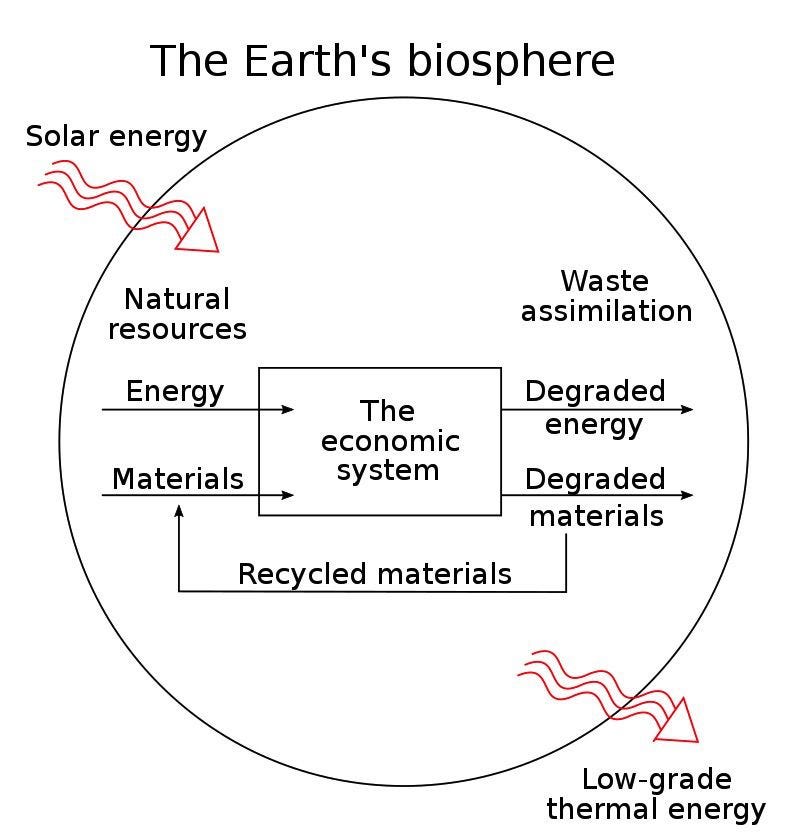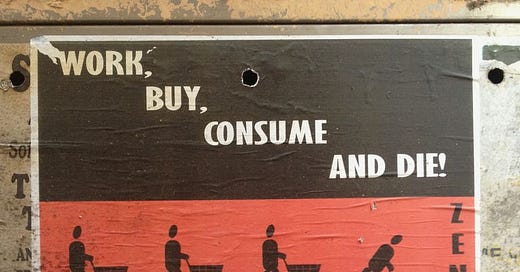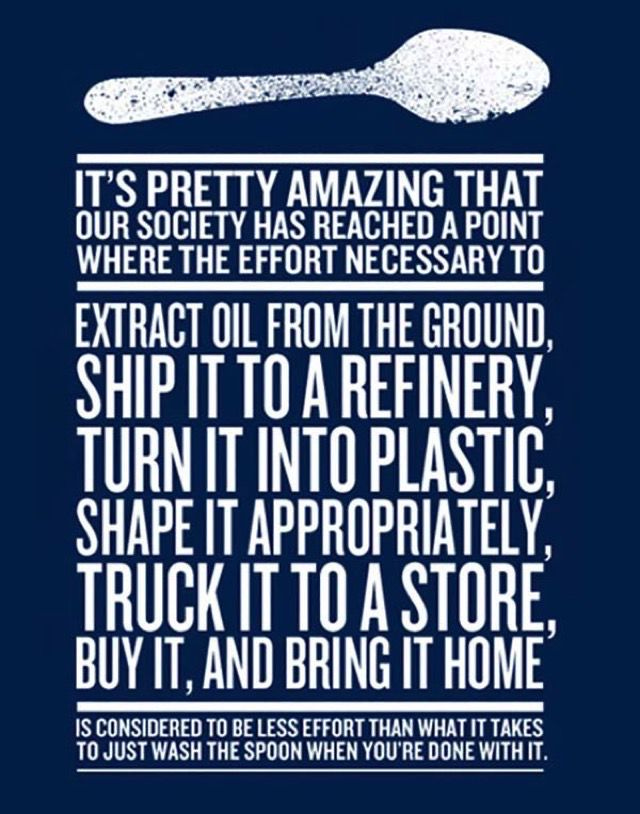From the archives: How should we approach Black Friday?
In a time of climate crisis, we have to just buy less stuff.
I wrote this on Treehugger for Black Friday a few years ago. The original is still up, but I thought it was worth repeating here as it is mostly an excerpt from my book, Living the 1.5 Degree Lifestyle.
In a recent series of interviews on Canadian radio, I was asked what people should be doing on Black Friday. I trotted out the usual responses, including boycotting it and coming up with alternatives or celebrating Buy Nothing Day. Treehugger has also suggested more sustainable products with lower climate impact. But it also got me thinking again about the question of why we buy and why we have this obsession with shopping in the first place.
In my recent book, "Living the 1.5 Degree Lifestyle," I discussed this in terms of our carbon footprints, quoting physicist and economist Robert Ayres, who teaches that economics is a thermodynamic process.
"The essential truth missing from economic education today is that energy is the stuff of the universe, that all matter is also a form of energy, and that the economic system is essentially a system for extracting, processing, and transforming energy as resources into energy embodied in products and services."

In other words, the entire purpose of the economy is to turn energy into stuff. All that energy in fossil fuels is really concentrated solar energy, which is then degraded into waste and low-grade thermal energy. That's the economic system: The more energy put through the system, the richer the world gets. Vaclav Smil said this in his book "Energy and Civilization: A History."
"To talk about energy and the economy is a tautology: every economic activity is fundamentally nothing but a conversion of one kind of energy to another, and monies are just a convenient (and often rather unrepresentative) proxy for valuing the energy flows."
Every time we shop, we are converting energy flows into profit. Every time we throw something away, we are participating in the economic activity of turning energy into waste. Black Friday, and almost every other aspect of our society, is actively abetting and encouraging this. From "Living the 1.5 Degree Lifestyle," an explanation of how marketing aids and abets this:
There is no point in making stuff unless someone is going to buy it. The stuff has gotta move. In his 1960 classic "The Waste Makers," ( review here in archives) Vance Packard quotes banker Paul Mazur:
"The giant of mass production can be maintained at the peak of its strength only when its voracious appetite can be fully and continuously satisfied. It is absolutely necessary that the products that roll from the assembly lines of mass production be consumed at an equally rapid rate and not be accumulated in inventories."
Packard also quotes marketing consultant Victor Lebow:
"Our enormously productive economy...demands that we make consumption our way of life, that we convert the buying and use of goods into rituals, that we seek our spiritual satisfactions, our ego satisfactions, in consumption... We need things consumed, burned up, worn out, replaced, and discarded at an ever-increasing rate."
This is why the car-dominated suburban lifestyle was such a success at creating a booming economy in North America. It generated so much more room for stuff, for consumption, creating a need for endless consumption of vehicles and the fuel to power them and the roads to run them on. For the hospitals, the police, and all the other parts of the system.
It would be hard to imagine a system that turns more energy into stuff. It is why houses get bigger and cars turn into SUVs and pickup trucks: more metal, more gas, more stuff. It is why governments are loath to invest in public transit or alternatives to cars: A streetcar lasts 30 years and doesn’t add to the consumption of stuff; there is nothing in it for them. They want a booming economy and that means growth, cars, fuel, development, and making stuff. It’s why they build tunnels in Seattle, bury streetcars in Toronto, and fight over parking in New York City: Rule 1 is never inconveniencing the drivers of cars; they are engines of consumption.
For years, going back to the 1930s, there has been talk about planned obsolescence being built into products. One industrial designer told Packard:
"Our whole economy is based on planned obsolescence, and everybody who can read without moving his lips should know it by now. We make good products, we induce people to buy them, and then next year we deliberately introduce something that will make those products old fashioned, out of date, obsolete... It isn’t organized waste. It’s a sound contribution to the American economy."
Packard was writing long before Ayres or Smil but would have understood the basic principle: It is all about turning energy into stuff and selling as much of it as possible. And when we buy, we are contributing directly to that conversion of energy, a byproduct of which is carbon dioxide. It's why we have been inculcated in this culture of convenience, to go through all this effort, to keep the fossil fuels flowing and the economy pumping out wealth.
In my book, I conclude each chapter with the question, "what can we do?" for consumer goods, I wrote:
"From computers to clothing, the question about sufficiency applies: how much do we really need? It appears that, for any consumer good, the best strategy is to buy high quality with timeless design, maintain it well, and use it for as long as you can."
But on Black Friday, one might also suggest buying low-carbon, be it toys made out of wood for the kids or foodstuffs for the grownups. Think about the carbon, and think about whether we need it at all. Last word from Smil:
"Modern societies have carried this quest for variety, leisure pastimes, ostentatious consumption, and differentiation through ownership and variety to ludicrous levels and have done so on an unprecedented scale...Do we really need a piece of ephemeral junk made in China delivered within a few hours after an order was placed on a computer? And (coming soon)by a drone, no less!"





Love the point about energy aside have been making that same argument re life in space in its full range of permutations, since humans will need to fully replicate a livable environment in a place where everything there is lethal, energy will become the unit of exchange.
Word of caution: a lot of people hold off on purchases they would otherwise make during the year to take advantage of the pricing offers on Black Friday. We needed a new vacuum cleaner as the old one, repaired twice, finally had the rotary beater gear shear apart (and the cost to fix again is prohibitively expensive) so rather than dash out to Walmart and grab the first cheap thing we could find, we held off until Black Friday when lots of manufacturers are offering deals. Did it mean the house was left a little more dirty for a few weeks? Yup—but in the end we saved 20% on a quality vacuum by waiting.
And don't forget, people need things all. the. time. Black Friday just happens to be a better day than most to get bargains.